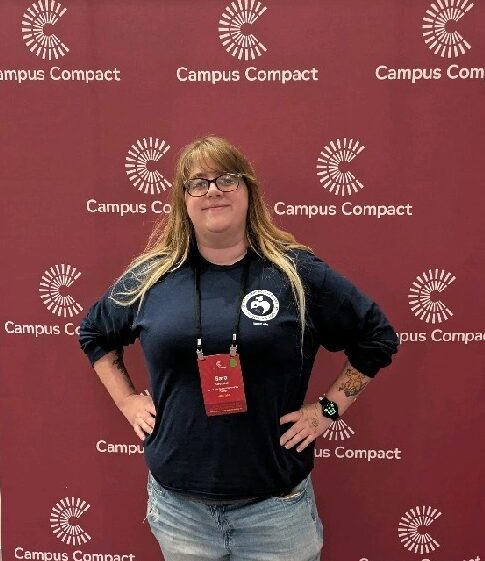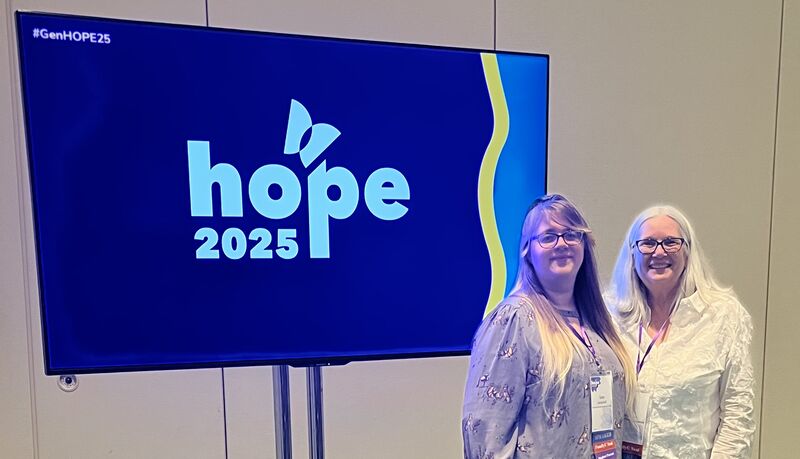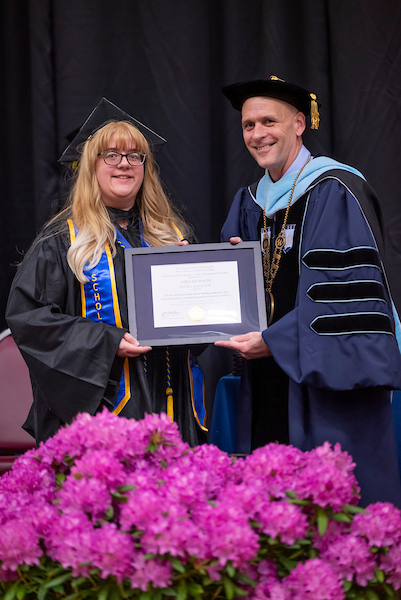
Sara Leopaldi is a passionate advocate, leader, and changemaker whose commitment to service has left a profound impact on the Mount Wachusett Community College (MWCC) campus and the wider region it serves. As the 2025 recipient of the prestigious Service Above Self Award, Sara has distinguished herself through her unwavering dedication to supporting student parents, expanding access to early childhood education, and fostering inclusive, supportive environments for families navigating higher education.
By a personal connection to Autism, she pursued a degree in Early Childhood Education for Exceptional Children while simultaneously leading MWCC’s Child Watch program and serving as a Newman Civic Fellow. Whether presenting at national conferences or organizing community-centered workshops, Sara’s leadership exemplifies the power of empathy, service, and a deep-rooted belief in creating lasting change.
First off, congratulations on receiving the Newman Fellowship! What was that like for you?
Receiving the Newman fellowship and taking part in the workshops and opportunities provided was a life-changing experience in my education and my personal growth.
How did you find out you got it, and what went through your head when you did?
I was told by Ann Reynolds that I was receiving the Newman Fellowship and when I attended the service learning award ceremony I was awarded this Newman Fellowship but had no idea what this was or the extent it would impact my life.
My head could not wrap my head around the fact I was being given this prestigious opportunity for the work I have done for the community. I have never been the student with honors or the student getting an award so this was a whole new experience and feeling for me. I truly did not believe I deserved this Newman fellowship at first. I thought to myself they have the wrong person for this and why would they choose me? I haven’t even done that much.
What was it like going to the ceremony?
Being awarded the Newman Fellowship was a truly unforgettable experience. From the ceremony at MWCC to attending every workshop offered by Campus Compact and the fellowship, to finally participating in the Newman Convening in Chicago—it was a journey of growth and discovery.
In the months following the fellowship announcement, I immersed myself in leadership development workshops, gaining insight into what it truly means to be an intentional community leader. These workshops covered topics such as public policy, trauma-informed care, Civic Engagement, and how to create positive change within communities. I learned so much—not just from the content, but also by connecting with students from across the country, all engaged in different types of civic work on their campuses.
One of the most impactful parts of the experience was the opportunity to build relationships and collaborate with these future community leaders through Zoom workshops. The highlight was attending the Newman Convening in Chicago, a three-day event packed with sessions focused on civic engagement and community leadership. When I first arrived at the convening, I honestly felt out of place. I didn’t fully understand what civic engagement was, and I was surrounded by students who had already made such profound impacts on their campuses and in their communities.
But everything shifted on that first day. I found myself in a session about creating change on campus, listening to others share their journeys. At that moment, I began to see why I was chosen for this honor. I realized just how much I had already done for my own campus and community. The other Newman Fellows, who I had been nervous to meet, quickly became friends and collaborators—people I continue to work with today. The friendships, knowledge, and skills I gained through this experience have shaped me into a stronger community leader and a better human being, committed to creating positive change not just on campus, but in the wider community.
This opportunity also profoundly boosted my confidence and self-esteem. As someone who has struggled with self-doubt, it was humbling to be surrounded by such accomplished scholars—people who reminded me that I do deserve to be here, and that I am making a meaningful difference in the lives of children and families in my community.

What advice would you give to someone thinking about applying for the Newman Fellowship? Anything you learned during the process that could help someone else?
The advice I would give is this: Don’t just accept the Newman Fellowship and consider it done—fully engage with everything it offers. Take part in as many workshops as you can, and if at all possible, attend the Newman Convening.
I also highly recommend applying for the mini-grant to help create even more positive change on your campus. Truly participating in the fellowship—not just accepting the title—can be a life-changing experience. It opens the door to incredible opportunities for personal growth, leadership development, and meaningful connections with others who are deeply passionate about civic engagement.
Being a Newman Fellow is a distinguished honor and should be taken seriously. Don’t let this opportunity for growth and networking pass you by—it’s something you don’t want to look back on with regret.
Let’s talk about student-parent support—how’s that going? Do you have a sense of how many student parents are using the service right now? Is there still room for more folks to join in?
This semester, we have served over 50 parents and more than 100 children. However, we currently have many student parents on a waitlist due to limited room space. Our current room can only accommodate a maximum of eight children, which creates significant challenges for our service program’s infrastructure on campus. As a result, we are unable to serve every student parent or assist every family in need because of these limitations.
What are the hours like for student-parent support services? And are there any plans to expand—maybe even bring them to the Leominster campus?
Our hours are based on student-parent schedules, but we are typically open from 8:00 AM until at least 4:00 PM. While we would love to expand our services, doing so requires additional funding and resources, which we currently lack. Expanding to the Leominster campus is part of our plan, but we need to ensure we have a bigger room and ample resources on the Gardner campus first.
Do you have a favorite memory or moment from your time working on these student support initiatives? Something that made you smile, or maybe reminded you why you do the work you do.
Every single day I come to work, I’m reminded of why I do this—it’s for the children and their families. Not everyone has a “village” to help them raise a family while earning a degree. As a student parent myself, I’ve made it my mission to ensure these children and families have access to all the resources and support they need, both on and off campus. Many memories are etched into my mind, from children learning to walk and talk, to helping families apply for housing, to guiding parents on how to play and engage with their children through specific challenges.
However, the memory I hold most dearly is one I will never forget: giving a young boy the opportunity to watch his mom walk across the stage at graduation. It was just the two of them—no extended family or friends to support them. We became their village. When his mom’s name was called, and she walked across that stage, this seven-year-old was bursting with pride, cheering his mom on. She was incredibly grateful, and that moment was something that child will carry with him for the rest of his life.

What kind of impact do you hope programs like the Newman Fellowship or student-parent support have on the community here? Big or small—what kind of changes would be a win in your eyes?
I hope the impact of the Newman Fellowship encourages more fellows to actively engage in shaping and improving our community, regardless of the challenges posed by the political climate. Regarding student-parent support, I hope these parents gain more recognition for their unique contributions. Data shows that student parents often have higher GPAs and retention rates compared to traditional students—provided they have access to the right resources and support for success.
Programs like the child watch service are creating greater accessibility for an undervalued and often overlooked population, making a meaningful difference in their lives. One change that could significantly improve our service would be acquiring a larger room with the proper equipment to better care for these children and families on campus.
What’s next for you? Any upcoming projects or goals you’re excited about—personally or within the college?
“What’s next for me?” is a question I keep asking myself. While I don’t have a full answer yet, I do know that I will be transferring to Framingham State University to pursue my bachelor’s degree in Early Childhood Education through a community-based program and minoring in American Sign Language.
I will continue my work at MWCC for now, but I’m uncertain where my journey will lead in the future. One thing I do know for sure is that I will continue working with children and families, supporting their well-being and success as they grow and thrive.

